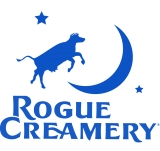

Rogue Creamery

Oregon, United States
June 2016
Agricultural Processing
Manufacturing
United States
Inspired by a sense of place since 1933, Rogue Creamery draws from the beauty and flavors of Southern Oregon’s Rogue River Valley to create nine distinctive varieties of handcrafted blue cheeses and a variety of gourmet cheddars. Over the last 60 years , Rogue Creamery blue cheeses have received international acclaim. The USDA Certified Organic whole milk they use to make these original blues comes from their 75 acre dairy located along the banks of the rugged and scenic Rogue River. The creamery has won over 100 international and national awards .In 2016 its Flora Nelle and Rogue River Blue cheeses both won 1st Place at the 2016 Good Food Awards in San Francisco. Its Rogue River Blue cheese was awarded Best Blue Cheese @ the 2015 U.S. Cheese Championships, “Best of Show” at both the 2011 & 2009 American Cheese Society Competitions and “Best Blue Cheese” at the World Cheese Awards in London, England. Its Caveman Blue was awarded Super Gold (one of the Top 60 Cheeses in the World) @ the World Cheese Awards in 2014. Rogue Creamery registered as the 1st Benefit Company in the state of Oregon in 2014.
Overall B Impact Score
Governance 16.2
Governance evaluates a company's overall mission, engagement around its social/environmental impact, ethics, and transparency. This section also evaluates the ability of a company to protect their mission and formally consider stakeholders in decision making through their corporate structure (e.g. benefit corporation) or corporate governing documents.
What is this? A company with an Impact Business Model is intentionally designed to create a specific positive outcome for one of its stakeholders - such as workers, community, environment, or customers.
Workers 23.8
Workers evaluates a company’s contributions to its employees’ financial security, health & safety, wellness, career development, and engagement & satisfaction. In addition, this section recognizes business models designed to benefit workers, such as companies that are at least 40% owned by non-executive employees and those that have workforce development programs to support individuals with barriers to employment.
Community 17.9
Community evaluates a company’s engagement with and impact on the communities in which it operates, hires from, and sources from. Topics include diversity, equity & inclusion, economic impact, civic engagement, charitable giving, and supply chain management. In addition, this section recognizes business models that are designed to address specific community-oriented problems, such as poverty alleviation through fair trade sourcing or distribution via microenterprises, producer cooperative models, locally focused economic development, and formal charitable giving commitments.
Environment 20.9
Environment evaluates a company’s overall environmental management practices as well as its impact on the air, climate, water, land, and biodiversity. This includes the direct impact of a company’s operations and, when applicable its supply chain and distribution channels. This section also recognizes companies with environmentally innovative production processes and those that sell products or services that have a positive environmental impact. Some examples might include products and services that create renewable energy, reduce consumption or waste, conserve land or wildlife, provide less toxic alternatives to the market, or educate people about environmental problems.
Customers 4.3
Customers evaluates a company’s stewardship of its customers through the quality of its products and services, ethical marketing, data privacy and security, and feedback channels. In addition, this section recognizes products or services that are designed to address a particular social problem for or through its customers, such as health or educational products, arts & media products, serving underserved customers/clients, and services that improve the social impact of other businesses or organizations.